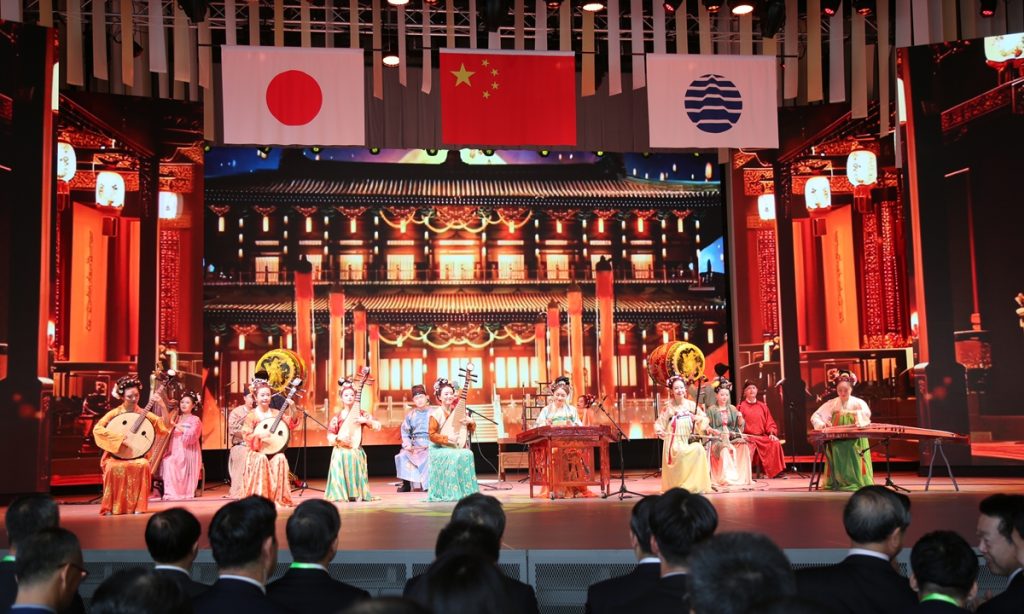China Pavilion Day debuts at Osaka Expo

Chinese Vice Premier He Lifeng on Friday attended China's National Pavilion Day at Expo 2025 Osaka and delivered a speech, expressing China's willingness to work with Japan to promote a strategic and mutually beneficial relationship, the Xinhua News Agency reported.
He, also a member of the Political Bureau of the Communist Party of China Central Committee, highlighted that the Expo serves as an important platform for promoting mutual learning among civilizations, fostering social progress, and strengthening friendship among peoples.
The Chinese government attaches great importance to the country's participation in Expo 2025 Osaka, he said, noting that the China Pavilion showcased China's practices in ecological civilization and promoted the country's development philosophy of respecting, adapting to, and protecting nature.
Through immersive exhibitions, interactive experiences, and diverse cultural activities, global visitors will gain a genuine, lovable, and respectable image of China, he said.
"China is willing to work with Japan to implement the important consensus reached by the leaders of the two countries and jointly promote a strategic and mutually beneficial relationship, so as to build a constructive and stable China-Japan relationship that meets the needs of the new era," he said.
The Chinese vice premier visited the China and Japan pavilions at the Expo, and held friendly exchanges with Japan's Liberal Democratic Party Secretary-General Hiroshi Moriyama and representatives from Kansai-based economic organizations.
Expo 2025 Osaka, themed "Designing Future Society for Our Lives," opened on April 13 and runs until October 13, 2025. China's National Pavilion Day was held on Friday, with more than 400 attendees from both countries' political, business, media and cultural circles as well as international pavilion representatives, according to Xinhua.
Covering approximately 3,500 square meters, the China National Pavilion is one of the largest foreign-built pavilions at this year's Expo, according to data from the China Council for the Promotion of International Trade (CCPIT).
On the China Pavilion Day, a grand cultural performance titled "Splendid China, Co-Creating the Future" took place within the Expo grounds. Rooted in Chinese cultural aesthetics within a global context, the show featured a mix of music, dance, opera, calligraphy, martial arts, acrobatics, and intangible cultural heritage displays, China Media Group reported on Friday.
Since the Expo opened on April 13, the China National Pavilion has welcomed over 760,000 visitors, averaging nearly 10,000 daily, according to CCPIT data.
"We attach importance to the Osaka Expo," Chinese Foreign Ministry spokesperson Mao Ning said on Thursday, responding to inquiries about China's expectations for the National Pavilion Day. "We hope that through the wonderful exhibition and diverse activities of the China National Pavilion, people from all countries will gain a better understanding of China," Mao noted.
Analysts said that recent high-level and grassroots exchanges between China and Japan have created a positive atmosphere for improving bilateral relations.
The Osaka Expo is a key opportunity to demonstrate both countries' willingness to deepen ties and cooperation across various sectors, said Wu Yingjie, research fellow with the Centre for Japanese Studies at the University of International Business and Economics. "As a highly watched global event, the Expo provides a platform for economic and cultural engagements," Wu added.
China-Japan economic ties are recovering, but they still face a transitional phase requiring innovative cooperation, policy coordination, and people-to-people engagement, Wu noted, and caution about political disruptions is still needed.
A day earlier, Chinese Foreign Minister Wang Yi, also a member of the Political Bureau of the Communist Party of China Central Committee, met with Japanese Foreign Minister Takeshi Iwaya in Kuala Lumpur, Malaysia. "China and Japan are important neighbors, and the relationship between the two countries is of far-reaching significance beyond the bilateral scope," Wang said.
Japan looks forward to working with China to strengthen exchanges at all levels and promote cooperation in various fields, Iwaya noted.
Progress in China-Japan relations has been seen in the area of trade. Earlier in June, China conditionally approved the resumption of Japanese seafood imports from select regions, effective from June 29, following verification of safe discharge monitoring data and Tokyo's quality guarantees. Japanese media reports said the move was aimed at easing trade tensions while bolstering bilateral relations.
However, Wu cautioned that China-Japan economic relations still face challenges, with external political uncertainties remaining a destabilizing factor.
To foster positive momentum, Wu suggested expanding cooperation in AI, the digital economy, elderly care, energy conservation, new energy and other emerging fields.
"Leveraging platforms like the Osaka Expo can unlock collaborative opportunities, while improved policy coordination and enhanced people-to-people trust will help to create favorable conditions for bilateral economic ties - these efforts require commitment from both nations," he added.